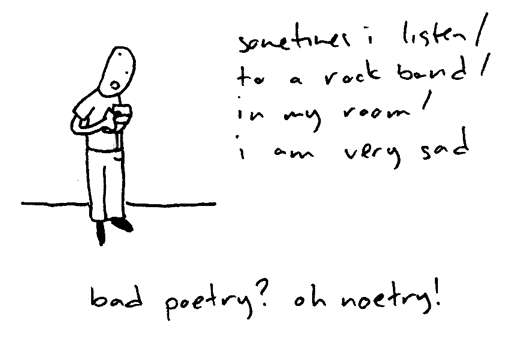Oranges
--Gary Soto
The first time I walked
With a girl, I was twelve,
Cold, and weighted down
With two oranges in my jacket.
December. Frost cracking
Beneath my steps, my breath
Before me, then gone,
As I walked toward
Her house, the one whose
Porch light burned yellow
Night and day, in any weather.
A dog barked at me, until
She came out pulling
At her gloves, face bright
With rouge. I smiled,
Touched her shoulder, and led
Her down the street, across
A used car lot and a line
Of newly planted trees,
Until we were breathing
Before a drugstore. We
Entered, the tiny bell
Bringing a saleslady
Down a narrow aisle of goods.
I turned to the candies
Tiered like bleachers,
And asked what she wanted -
Light in her eyes, a smile
Starting at the corners
Of her mouth. I fingered
A nickle in my pocket,
And when she lifted a chocolate
That cost a dime,
I didn’t say anything.
I took the nickle from
My pocket, then an orange,
And set them quietly on
The counter. When I looked up,
The lady’s eyes met mine,
And held them, knowing
Very well what it was all
About.
Outside,
A few cars hissing past,
Fog hanging like old
Coats between the trees.
I took my girl’s hand
In mine for two blocks,
Then released it to let
Her unwrap the chocolate.
I peeled my orange
That was so bright against
The gray of December
That, from some distance,
Someone might have thought
I was making a fire in my hands.
____________________________________________________

Soto's poem, like so many others, is a combination of image, diction, and rhetoric. The diction in this maybe the weakest as it doesn't call upon much beyond the actual meaning of the words, but it doesn't detract from the poem, it is what allows the rhetoric and the images to do their work. Image and rhetoric are on even keel with one another, supporting each other. Soto's images are vivid, they are truly the first element that is seen in this poem. Soto uses colors and rich sensory language to craft his images. Similarly, he crafts images that work like diction works - images that evoke nostalgic responses in the reader that have far reaching historic values ascribed to them. By partnering image and rhetoric in this way, Soto creates a potent and absorbing poem; one that is familiar to the reader, even if they have not experienced this scenario themselves. Soto uses image and rhetoric to tap into our shared cultural experience of young life and love.
_______________________________________________
The Morning Baking
--Carolyn Forché
Grandma, come back, I forgot
How much lard for these rolls
Think you can put yourself in the ground
Like plain potatoes and grow in Ohio?
I am damn sick of getting fat like you
Think you can lie through your Slovak?
Tell filthy stories about the blood sausage?
Pish-pish nights at the virgin in Detroit?
I blame your raising me up for my Slav tongue
You beat me up out back, taught me to dance
I'll tell you I don't remember any kind of bread
Your wavy loaves of flesh
Stink through my sleep
The stars on your silk robes
But I'm glad I'll look when I'm old
Like a gypsy dusha hauling milk
Copyright © 1976 Carolyn Forché. All Rights Reserved.
________________________________________________________
Forché's poem takes a similar approach, in that she combines each of these elements, but in this case, I see each of these elements working in tandem, at the same time. I like this because it allows me to see which element is most potent, with all parts being equal. With words like "plain" she calls upon the iconography of the midwest, but also the words other meanings - unattractive, straightforward, a field of land. This is just one of the many brilliant moments of diction in this poem.
The imagery is also very vivid. Lines like "your wavy loaves of flesh/Stink through my sleep" are born in an instant in the minds eye; like Soto's poem, the picture is painted clearly and one is able to identify and call forth the image even without direct experience, because we share it already. Imagery is the most immediate and powerful vehicle a poem can utilize and this poem uses it effectively.
Though images are powerful and diction adds complexity and layers of meaning, it is rhetoric that guides the reader though the poem, though the experience and points to what the poet wants to share through the poem. Without rhetoric, the poem can often be just an exercise - a game of language. For me, rhetoric is what elevates a poem from a cathartic exercise to an observation of the human condition, something that allows us to express the sensations of life that can't merely be said, but can only be pointed to.
The when image, diction and rhetoric are used like this, they add extraordinary complexity and layers of meaning that make poetry a wonderful well that can be drawn from again and again.

















